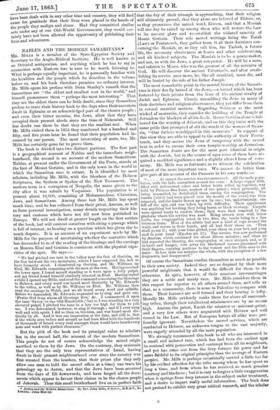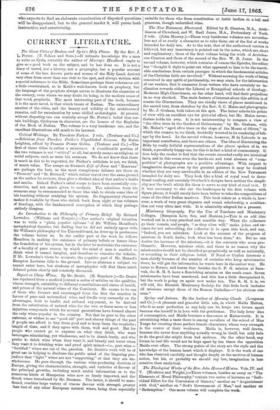NABLIJS AND THE MODERN SAMARITANS.* M. MILLS is a member
of the Syro-Egyptian Society and Secretary to the Anglo-Biblical Institute. He is well known as an Oriental antiquarian, and anything which he has to say in connection with Eastern lore is sure to be worth listening to. What is perhaps equally important, he is personally familiar with the localities and the people which he describes in the volume before us, and his book therefore promises no ordinary interest. Mr. Mills opens his preface with Dean Stanley's remark that the Samaritans are "the oldest and smallest sect in the world," and himself pronounces them " perhaps the most interesting." That they are the oldest there can be little doubt, since they themselves profess to trace their history back to the days when their ancestors dwelt in Ephraim as an acknowledged part of the chosen people ; and even their bitter enemies, the Jews, allow that they have occupied their present abode since the time of Nehemiah. Still less doubt can there be that they are the smallest sect. When Mr. Millis visited them in 1855 they numbered but a hundred and fifty, and five years later he found that their population had in- creased by one person. The most interesting of sects, too, Mr. Mills has certainly gone far to prove them.
The book is divided into two distinct portions. The first part is a geographical account of Nablus and the immediate neigh- bourhood, the second is an account of the modern Samaritans. Nablus, at present under the Government of the Porte, stands at the foot of Mount Gerizim, and is the only town in the world in which the Samaritan race is extant. It is identified by most scholars, including Mr. Mills, with the Shechem of the Hebrew Scriptures, the Sychem or Sychar of the New Testament. The modern term is a corruption of Neapolis, the name given to the city after it was rebuilt by Vespasian. The population is at present about 10,000, consisting of Mohammedans, Christians, Jews, and Samaritans. Among these last Mr. Mills has spent much time, and he has collected from their priest, Amram, as well as from personal investigation, many details respecting their his- tory and customs which have not till now been published in Europe. We will not dwell at greater length on the first section of the book, but will content ourselves with citing a passage which is full of interest, as bearing on a question which has given rise to much dispute. It is an account of an experiment made by Mr. Mills for the purpose of ascertaining whether the narrative which has descended to us of the reading of the blessings and the cursings on Mounts Ebal and Gerizim is consistent with the physical capa- cities of the spot. He says :—
" We had pitched our tent in the valley near the foot of Gerizim, on the line between the two mountains, where I have supposed the Ark to have formerly stood. I clambered up Gerizim, and Mr. Williams up Ebal, Mr. Edwards remaining with the men at the tent. Having reached the lower spur, I found myself standing as it were upon a lofty pulpit, and my friend found himself similarly situated on Ebal. Having rested awhile I opened my Bible, and read the command concerning the blessings in Hebrew, and every word was hoard most distinctly by Mr. Edwards is the valley, as well as by Mr. Williams on Ebal. Mr. Williams then read the cursings in Welsh, and we all heard every word and syllable. Before wo descended, Mr. Edwards requested us to sing, and gave out, 'Praise God from whom all blessings flow,' dro. I commenced it upon the tune 'Savoy,' or the 'Old Hundredth ;' but as I was standing on a very elevated pulpit, I pitched the tune in a key too high for them to join me. I was determined, however, to sing it through ; and if I ever sang well and with spirit, I did so then on Gerizim, and was heard most dis- tinctly by all. And it was our impression at the time, and still is, that if the whole area before and around us had been filled with the hundreds of thousands of Israel, every soul amongst them would have heard every note and word with perfect clearness."
But the pith of the book and its principal value to scholars lies in the second half, the account of the modern Samaritans. This people do not of course acknowledge the mixed origin ascribed to them by the Jews. On the contrary, they maintain that they are the only true representatives of Israel, having dwelt in their present neighbourhood ever since the country was first wrested from the heathen, that their priest (for they only allow one man to hold the sacred office at a time) can trace his genealogy up to Aaron, and that the Jews have been accursed from the days of Eli downwards, and have forged all the docu- ments which appear to favour their claims to be the chosen people of Jehovah. Thus this small brotherhood live on in perfect faith
* arabita and the Modern Satharitatu. By Bor. John de. London : John *Murray.
that the day of their triumph is approaching, that their religion will ultimately prevail, that they alone are beloved of Elohim, or, as they pronounce the sacred word, Elwem, and that a Messiah will one day be raised up among them who will restore the Law to its ancient glory and re-establish the violated sanctity of Mount Gerizim. Their sole sacred writings being the Torah (Law) or Pentateuch, they gather from it all their doctrines con- cerning the Messiah, or, as they call him, the Taebah, a future life, the necessary observances at feasts and other celebrations, and all kindred subjects. The Messiah is to be a peace-maker, and not, as with the Jews, a great conqueror. He will be a man, and inferior to Moses, who was the greatest of all the servants of God. He will discover the ancient Tabernacle, and after estab- lishing its service once more, he, like all mankind, must die, and will be buried by the side of his father Joseph.
The most remarkable point in the mental history of the Samari- tans is their deadly hatred of the Jews,—a hatred which has been fostered by their priests from the time of the ancient rivalry of Judah and Ephraim. Closely resembling the Jews in many of their doctrines and religious observances, they yet differ from them in several essential matters. Regarding Solomon as the most wicked of monarchs, they consider the building of the Temple at Jerusalem the blackest of all his deals. Mount Gerizim alone is hal- lowed fop the worship of Jehovah, and on this they insist with the same pride that prompted of old the words of the woman of Sama- ria, "Our fathers worshipped in this mountain." In support of this view they are able to appeal to the authority of their Penta- teuch, and they accuse the Jews of tampering with the sacred text in order to excuse their own temple-worship at Jerusalem. The Samaritan feasts are for the most part identical in origin with the Jewish, but in the course of ages some of them have ac- quired a modified significance and a slightly altered form of cere- mony. Mr. Mills was so fortunate as to witness the celebration of most of the more important ones. We cannot do better than give part of his account of the Passover in his own words :-
" . . . At sunset the service was recommenced. All the male popu- lation, with the lads, assembled around the oven. A largo copper dish, filled with unleavened cakes and bitter herbs rolled up together, was held by Phineas Ben Isaac, nephew of the priest ; when presently, all being assembled, he distributed thom among the congregation. The hurdle [which had been placed over the mouth of the oven] was then removed, and the lambs drawn up one by one ; but, unfortunately, one fell off the spit, and was taken up with difficulty. Their appearance was anything but inviting, they being burnt as black as ebony. Carpets were spread ready to receive them ; they were then removed to the platform where the service was read. Being strewn over with bitter herbs, the congregation stood in two files, the lambs being in a line between them. Most of the adults had now a kind of rope around the waist, and staves in their hands, and all had their shoes on. Thus shall ye eat it ; with your loins girded, your shoes on your feet, and your staff in your hand' (Exodus xii. 11). The service was now performed by Amram, which continued for about fifteen minutes ; and when he had repeated the blessing, the congregation at once stooped, and, as if in haste and hunger, tore away the blackened masses piecemeal with their fingers, carrying portions to the women and the little ones in the tents. In less than ten minutes the whole, with the exception of a fow fragments, had disappeared."
Of course the Samaritans confine themselves as much as possible to their own society. Indeed they are so despised by their more powerful neighbours that it would be difficult for them to do otherwise. In spite, however, of their constant intermarriages they are a noble and manly race. Mr. Mills considers them in this respect far superior to all others around them, and tells us that, as a community, there is none in Palestine to compare with them. Their features are well formed and their bearing is lofty. Morally Mr. Mills evidently ranks them far above all surround- ing tribes, though their intellectual attainments are by no means high. Amram the priest, Yacub the minister or assistant-priest, and a very few others were acquainted with Hebrew and well versed in the Law. But of European letters all alike were pro- foundly ignorant. Nevertheless the sacred services, which are conducted in Hebrew, an unknown tongue to the vast majority, were eagerly attended by all the male population. We strongly recommend this book to all who are interested in a small and isolated race, which has had from the earliest ages to contend with persecution and contempt from all its neighbours, and yet has crane out from the fiery furnace far purer and far mere faithful to its original principles than the average of Eastern peoples. Mr. Mills is perhaps occasionally carried a little too far by his evident affection for the tribe among whom he has spent so long a time, and from whom he has received so much genuine courtesy and kindness ; but it is easy to forgive a little exaggeration when it springs from deep interest in the subject under treatment,
and a desire to impart really useful information. The book does not pretend to exhibit very great critical research, and the scholar who expects to find an elaborate examination of disputed questions will be disappointed, but to the general reader it will prove both instructive and entertaining.































 Previous page
Previous page